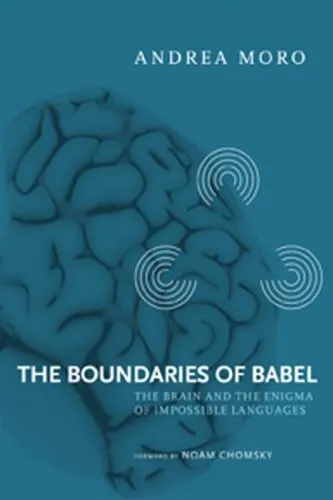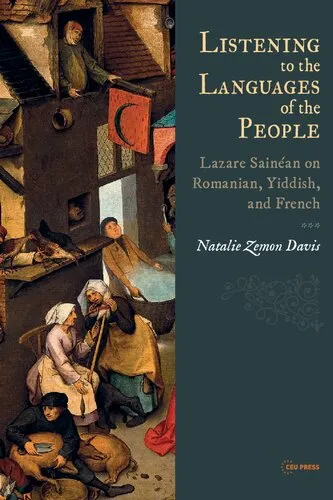The Boundaries of Babel: The Brain and the Enigma of Impossible Languages
4.5
Reviews from our users

You Can Ask your questions from this book's AI after Login
Each download or ask from book AI costs 2 points. To earn more free points, please visit the Points Guide Page and complete some valuable actions.Related Refrences:
Introduction to "The Boundaries of Babel: The Brain and the Enigma of Impossible Languages"
Language is one of the most profound and uniquely human abilities, yet the very mechanisms that enable us to communicate across cultures and societies remain shrouded in mystery. In The Boundaries of Babel, Andrea Moro undertakes an extraordinary journey to explore the intersection of linguistics, neuroscience, and human cognition. This book delves into the intriguing concept of "impossible languages"—languages that our brains are biologically incapable of processing or generating—and reveals groundbreaking insights that challenge our understanding of how language and the brain are intertwined.
The book operates at the crossroads of multiple disciplines, incorporating principles of linguistics, neuroscience, and cognitive psychology. It not only examines the constraints of human language but also raises critical questions about the very architecture of the brain. By drawing on modern technological tools, such as neuroimaging, as well as timeless philosophical debates about the nature of thought and expression, The Boundaries of Babel offers readers a fresh perspective on the limits—and the possibilities—of human cognition.
Structured as an elegant synthesis of empirical research, theoretical linguistics, and philosophical discussion, the book combines scientific rigor with intellectual curiosity. Moro invites both linguists and non-specialist readers to contemplate one of humanity’s greatest marvels: our ability to speak, think, and understand.
Detailed Summary of the Book
At its core, The Boundaries of Babel seeks to answer a fundamental question: Are there limits to what human languages can look like? Moro explores the theory of universal grammar, originally proposed by Noam Chomsky, and uses it as a foundation to discuss how some languages fall within the realm of human possibility while others do not.
The book begins by reviewing key concepts in generative linguistics and the notion of universal grammar, which posits that all human languages share an underlying structure encoded in the brain. Moro extends this framework by focusing on "impossible" languages—hypothetical systems of communication that violate these universal principles, thereby revealing the constraints shaped by the neural architecture of the brain.
What sets this book apart is its emphasis on empirical neuroscience. Moro recounts revolutionary experiments involving brain-imaging techniques such as functional magnetic resonance imaging (fMRI) that scan brain activity during language processing tasks. Notably, the book emphasizes how the brain reacts differently to plausible and implausible linguistic structures, highlighting the presence of an innate linguistic filter that determines what is learnable.
Meanwhile, the book also steps beyond scientific methodology to tackle profound philosophical issues: Is language a tool for thought or a consequence of it? Is our capacity for linguistic creativity unlimited? Can the study of impossible languages reveal something deeper about the essence of human cognition?
Key Takeaways
- Language is bounded by universal principles rooted in the brain, challenging the notion of linguistic arbitrariness.
- Neuroscience shows that the brain has a tangible, biological mechanism that filters out "impossible" linguistic patterns.
- The concept of impossible languages offers a unique lens to study the relationship between language and cognition.
- Language and the brain are deeply interwoven, and their study provides insights into the nature of human thought and creativity.
Famous Quotes from the Book
"Impossible languages are not merely languages that no one speaks; they are languages that no one could ever speak."
"To understand the boundaries of language is to understand the boundaries of what it means to be human."
"The brain is not a blank slate; it carries the traces of the universal grammar from which all languages emerge."
Why This Book Matters
Andrea Moro's The Boundaries of Babel is more than a book on linguistics—it is an invitation to rethink how we understand human intelligence and creativity. By bridging linguistics and neuroscience, Moro breaks down interdisciplinary barriers and builds a robust case for why the study of language is central to understanding what makes us human.
From academics specializing in linguistic theory to readers fascinated by the mysteries of the mind, this book offers something for everyone. It challenges preconceived notions about the flexibility of linguistic systems while introducing scientific approaches to uncover the neural foundations of language. The discussion of "impossible languages" stands as a metaphor for humanity's inherent limitations, as well as its intellectual ambition to push against those boundaries.
Ultimately, The Boundaries of Babel matters because it opens new avenues of thought about the brain, cognition, and the linguistic universes we inhabit, while reminding us that even within apparent constraints, there is room for remarkable complexity and creativity.
Free Direct Download
Get Free Access to Download this and other Thousands of Books (Join Now)
For read this book you need PDF Reader Software like Foxit Reader



